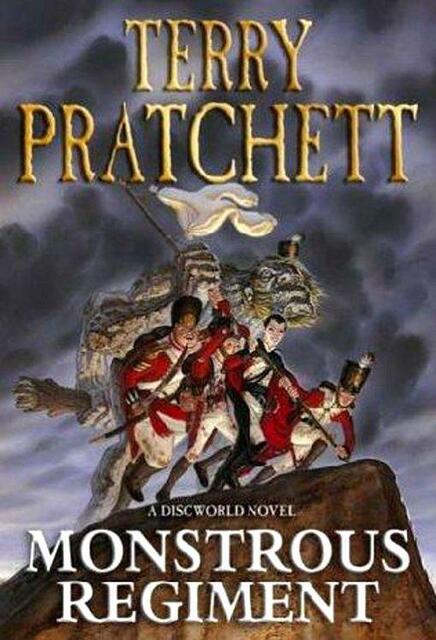Review: Monstrous Regiment
Review of Monstrous Regiment
<span>(<a href="https://en.wikipedia.org/wiki/Discworld">Discworld</a> #31.0)</span>
by
(9780060013165)★★★★★ </span>

War has come to Discworld ... again.
And, to no one's great surprise, the conflict centers around the small, arrogantly fundamentalist duchy of Borogravia, which has long prided itself on its unrelenting aggressiveness. A year ago, Polly Perks's brother marched off to battle, and Polly's willing to resort to drastic measures to find him. So she cuts off her hair, dons masculine garb, and -- aided by a well-placed pair of socks -- sets out to join this man's army. Since a nation in such dire need of cannon fodder can't afford to be too picky, Polly is eagerly welcomed into the fighting fold—along with a vampire, a troll, an Igor, a religious fanatic, and two uncommonly close "friends." It would appear that Polly "Ozzer" Perks isn't the only grunt with a secret. But duty calls, the battlefield beckons. And now is the time for all good ... er ... "men" to come to the aid of their country.
“We are a proud country.” “What are you proud of?” It came swiftly, like a blow, and Polly realized how wars happened. … We have our pride. And that’s what we’re proud of. We’re proud of being proud…
In a few words, Terry Pratchett shows us why fiction and satire are so vital and powerful.
Next to Night Watch and Small Gods, Monstrous Regiment is now one of my favourite Discworld novels. Tackling issues of gender equality, the insanity of war, and the dangers of blind nationalism, here Pratchett is, in my opinion, at his more powerful and his most poignant.
Powerful, because his message is so clear and lucid without feeling too on-the-nose. Poignant because, through it all, he realizes that the characters are what matter most.
The great power in Pratchett’s characters is not in any one, remarkable act of bravery or heroism. Rather, he makes us care for these fictional people by showing us their small acts of kindness and nobility. By the end, we desperately want these people to succeed and be rewarded for that success because, above all, we like them.
In the field of science fiction and fantasy, it’s not unusual for authors to get so wrapped up in their clever concept that they forget that, at least for this reader, the characters are what truly matter. What makes Pratchett so remarkable is that he somehow manages to achieve both.
-
{% for webmention in webmentions %}
-
{{ webmention.content }}
{% endfor %}
No bookmarks were found.
{% endif %}Likes
-
{% for webmention in webmentions %}
-
{% if webmention.author %} {% endif %}
{% endfor %}
-
{% for webmention in webmentions %}
-
{{ webmention.content }}
{% endfor %}
No links were found.
{% endif %}Replies
-
{% for webmention in webmentions %}
-
{% if webmention.author %} {% endif %} {% if webmention.content %} {{ webmention.content }} {% else %} {{ webmention.title }} {% endif %}
{% endfor %}
-
{% for webmention in webmentions %}
- {% endfor %}
-
{% for webmention in webmentions %}
- {% endfor %}
No reposts were found.
{% endif %}-
{% for webmention in webmentions %}
- {% endfor %}
No RSVPs were found.
{% endif %}-
{% for webmention in webmentions %}
-
{% if webmention.author %} {% endif %} {% if webmention.content %} {{ webmention.content }} {% else %} {{ webmention.title }} {% endif %}
{% endfor %}
No webmentions were found.
{% endif %}